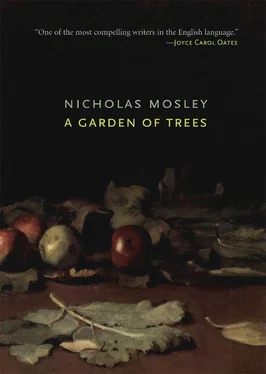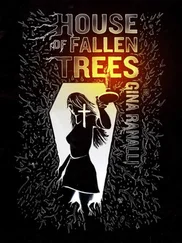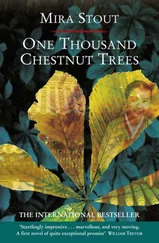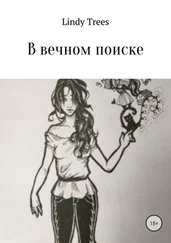I felt I myself had grown older. There was still, however, something of which to be afraid.
On the first day of spring there was a procession going down the road with its brass bands its soldiers and its children with their tiny toy flags. The visit of some foreign royalty or the commemoration of a dead event, I forget what it was, but the people were there waving their sleeves and taking their hats off just in case (a funeral perhaps or something to do with the Cenotaph?); the horses trotted in trappings of silver with sad sightless men on top of them and the band thumping out the heavy blaring music that goes on and on in circles ceaselessly like the revolutions of the word or the roll of the universe, a line coming up the street swinging in step and the people cheering as they always cheer at the beginning of war or at the symbol of death because war is deliverance and what they want is a holiday. The symbol of death on a bright spring day and a child upon the pavement. I saw Peter on the other side of the road and I waved at him.
Everyone was waving. I jumped up and down and was doing no more than paying my exaggerated respects to the carriage which, approaching from the direction of Trafalgar Square, contained two bowing personages who acknowledged my efforts. Peter’s fair head arose like a sunflower above the opposite border of bodies, but he was not as he had been once, the child leaning forwards flipping his pennies to the circus, he was older and tired as if he had watched a circus each night of his life until it had betrayed him. “Peter!” I yelled. He stood as if he were waiting to remove the debris. The pageant passed. He was like a shifter of cages who works in the dust.
His eyes did not see. I knew this look of eyes that did not see, I had stood so often myself with my head turned upon an imaginary shoulder, my own yet not my own because I was so distant from it, that it might have been I who was standing there on the opposite side of the road with my head drawn down beneath a waterfall of dreams. His ears did not hear. I did not believe that he could be sadder than I, having given up hope of the returning spring. Yet I was afraid of it. I wished I could throw something at him through the spray of sunlight.
There were horses trotting. I had seen them before, with Marius, in the running of crowds. Then a brick had been thrown through the stillness. “Peter!” I yelled.
Hearing only himself, or what he was thinking, with the band between us, he did no more than lean forwards into the sun so that the shadows came down over him like Marius again. Was then Marius now the bright-eyed angel? Peter having taken upon himself the sadness of the earth.
The carriage passed. Peter walked away. I would lose him on the barriers of interminable soldiers. I could not bear that my hope should go so suddenly.
I ran down a subway. There the crowd was swerving, thick, a child leaned steadily against my knees. I stepped over it, pushed, kicked against an ankle, they all turned behind me in affected concern. I fled, dodging, up some steps marked down. In the street there was dispersal. I ran to Trafalgar Square and found Peter beneath a fountain.
“You’re back,” I said. “I didn’t know.”
When he saw me he looked to each side of him as if he were expecting someone else. I thought, Perhaps he has been with people so long that he doesn’t understand his loneliness. “Didn’t you?”’ he said. “No, we didn’t know where you were.”
“I saw you when the band went by. I thought I had lost you.”
“Those damn bands,” he said. “They should only play at funerals.”
“I knocked a child over in the subway. I thought you had gone.”
“I hadn’t gone far,” he said.
He was leaning against the edge of the fountain with the water coming down behind him in a curtain. He screwed up his eyes as if the spray was in his face. “What have you been doing?” he said.
“Nothing important,” I said.
“No,” he said. “Nothing important.” It was as if he were leaning into the wind with the salt sea hurting him.
“And you?” I said.
“Well,” he said, “there really isn’t anything to do, is there?” People were beginning to look at him as if he were ill.
“Shall we go somewhere?” I said.
“Yes,” he said.
We crossed the road and passed beneath an arch that hung in forgotten triumph. In the Mall the trees narrowed into the distance. “When did you get back?” I said.
“The other day,” he said. A long straight road carrying cars to a palace. A world of Cinderellas with the fairies dead. “We didn’t know where you were,” he repeated.
“Nowhere that I could not have found you.”
“There is nothing to find,” he said.
We walked on. A ruined terrace beneath a ruined colonnade. In the park thin grass was brushed up over baldness, the trees shed palely the pretence of the sun. “There is nothing to find?”
“Up this road go savages to the sack of Rome,” Peter said.
We walked into the park. Lovers sat on the grass in couples. It was as if we were seeing ourselves already from memory. “Can you tell me a thing worth doing?” he said.
“Not if you think that is a question worth asking,” I said.
“Don’t you?”
“Yes,” I said.
“Damn them for making me hate them.”
“Who?”
“The beautiful people who lie on the grass,” he said.
A man lay with his girl’s head on his shoulder. Another leant with hair against his throat. “That is your answer,” I said. “Is that why you hate them?”
“Yes,” he said.
“Then it is you who are the savage at the sack of Rome.”
I stopped by a tree. I watched a leaf-bud drooping before me. The air contained it like rain. I thought, At this moment I know it is all over, that Peter never again will recognize the spring: I wonder how long it will take me to believe this.
“I was told,” Peter said, “to go abroad and gather flowers. These are instructions which are supposed to be profitable to a young man. It is presumed to be an encouraging metaphor. You see people practicing it in the bluebell woods in summer.”
“Didn’t you work?” I said.
“I sat in an office and circulated papers. Is that work? The papers enabled others to move upon the bluebells. Whatever it was, there was a great destruction in the woods.”
“Damn the woods. What did the work do to you?”
“I sat in a room like an electric cooker. There were a lot of figures: the figures did not mean anything, they were just on paper. Nothing meant anything. There was nothing but paper. We had enormous paper assets and not a penny to spend. What is the meaning of assets if you sit in a cooker? We bought and sold stuff that didn’t exist, we transferred money that didn’t exist to people who didn’t exist, the non-existent people spent the non-existent money on non-existent goods. The awful thing was that there weren’t even any bluebells. I couldn’t even get angry. I just cooked. I have now officially been eaten.”
“Why then did you try it, you knew. . ”
“What else was there for me to try?”
“I don’t know.”
“Should I have stood at street corners and made my complaint to the chariots? Would they have listened?”
“Then be a doctor or a teacher or make something with your hands.”
“Can you see me as a doctor or a teacher?”
“No,” I said.
“And there is nothing that I can make.”
“Lie on the grass, then. For God’s sake lie on the grass.”
“There was a girl called William. They all have boys’ names now. I could not speak to her.”
“Did you have to speak?”
“Yes, I had to speak. Any ass can like a William without speaking.”
“And couldn’t you admit for once that you are an ass?”
Читать дальше












